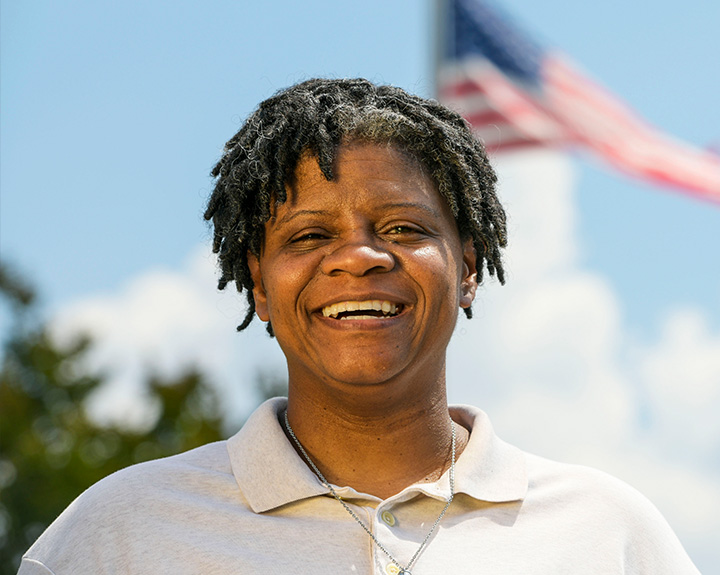
“I wouldn’t be here right now if it wasn’t for Wounded Warrior Project.”
Sam Hargrove
Sam Hargrove joined the U.S. Air Force in 1996 for the promise of a better life and a secure future. She never thought her job as an admin, working on computers, would put her in harm’s way — but in Iraq, everything was in harm’s way.
One morning in 2003, while calling home from a tent on her base in Tallil, a bomb exploded. The shock wave from the blast blew through the tent, knocking out the base’s communication system and leaving Sam with a traumatic brain injury. Miraculously, she was able to walk away
from the explosion — helping a junior Airman to safety along the way.
When she returned home, she couldn’t escape the memory of the blast and the hypervigilance she’d become accustomed to while deployed to a warzone. In 2010, Sam finally realized she needed help. “My godson told me he was scared of me,” says Sam. “I had a lot of anger issues.”
Sam got some counseling, but regular therapy was only helping a little bit. One night, she got drunk and intended to turn off the road and crash her car into a tree to end her pain. Thankfully, she never took that turn. The next day, she told her social worker that if she didn’t get help right
away, she would try to kill herself again.
He got her into a 90-day inpatient program, which helped while she was there — but she lapsed into negative patterns when she got back home. Then she learned about Wounded Warrior Project® (WWP). She started attending a local WWP Peer Support group that allowed her to build relationships with other veterans in her community. She also participated in a Couples’ Project Odyssey, which helped improve her relationship with her fiancée. But her biggest breakthrough came when she went through the Warrior Care Network® intensive outpatient program.
“I finally allowed myself to be open and tell it all and not just avoid what was going on,” says Sam. “That’s why I was able to deal with it — because I was able to just put it all out there.”
The follow-up care from Warrior Care Network made the program much more impactful than her previous treatments and has helped her continue to make progress. She has since become involved in other WWP programs to augment her treatment, like WWP Talk, which has kept her
moving forward. “To have a listening ear on the other line when you’re going through things is very important,” says Sam.
Now, Sam shares her experiences so other warriors will have hope. She wants them to realize they’re not alone, and that many others have overcome similar problems.
“It’s important for us to share our stories,” says Sam. “It helps another warrior understand ‘it’s not just me,’ or ‘I’m not the only one.’”